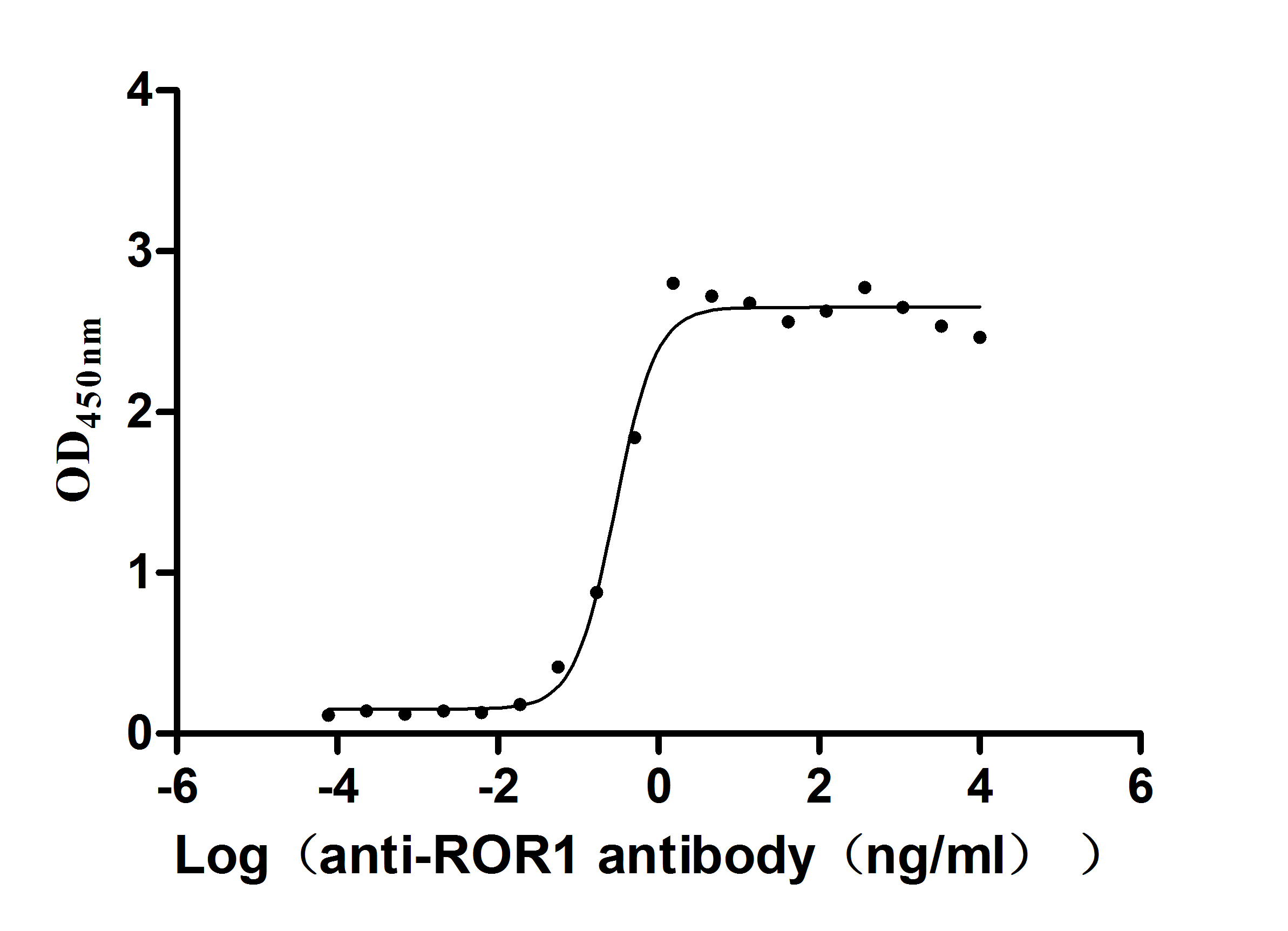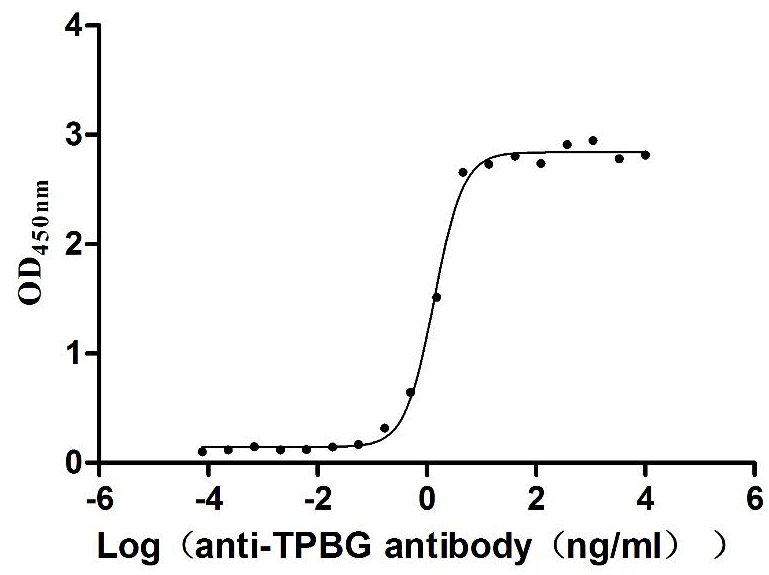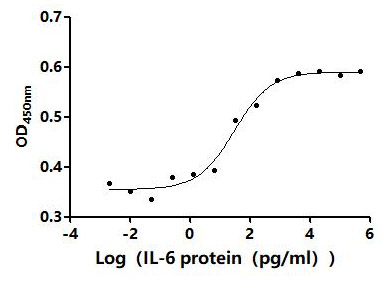Recombinant Human Interferon lambda-4 (IFNL4)
-
貨號(hào):CSB-YP128511HU
-
規(guī)格:
-
來(lái)源:Yeast
-
其他:
-
貨號(hào):CSB-EP128511HU
-
規(guī)格:
-
來(lái)源:E.coli
-
其他:
-
貨號(hào):CSB-EP128511HU-B
-
規(guī)格:
-
來(lái)源:E.coli
-
共軛:Avi-tag Biotinylated
E. coli biotin ligase (BirA) is highly specific in covalently attaching biotin to the 15 amino acid AviTag peptide. This recombinant protein was biotinylated in vivo by AviTag-BirA technology, which method is BriA catalyzes amide linkage between the biotin and the specific lysine of the AviTag.
-
其他:
-
貨號(hào):CSB-BP128511HU
-
規(guī)格:
-
來(lái)源:Baculovirus
-
其他:
-
貨號(hào):CSB-MP128511HU
-
規(guī)格:
-
來(lái)源:Mammalian cell
-
其他:
產(chǎn)品詳情
-
純度:>85% (SDS-PAGE)
-
基因名:IFNL4
-
Uniprot No.:
-
別名:Interferon lambda-4; IFN-lambda-4; IFNL4
-
種屬:Homo sapiens (Human)
-
蛋白長(zhǎng)度:Full Length of Mature Protein
-
表達(dá)區(qū)域:22-179
-
氨基酸序列AAPRRCLLSHYRSLEPRTLAAAKALRDRYEEEALSWGQRNCSFRPRRDPPRPSSCARLRHVARGIADAQAVLSGLHRSELLPGAGPILELLAAAGRDVAACLELARPGSSRKVPGAQKRRHKPRRADSPRCRKASVVFNLLRLLTWELRLAAHSGPCL
-
蛋白標(biāo)簽:Tag?type?will?be?determined?during?the?manufacturing?process.
The tag type will be determined during production process. If you have specified tag type, please tell us and we will develop the specified tag preferentially. -
產(chǎn)品提供形式:Liquid or Lyophilized powder
Note: We will preferentially ship the format that we have in stock, however, if you have any special requirement for the format, please remark your requirement when placing the order, we will prepare according to your demand. -
復(fù)溶:We recommend that this vial be briefly centrifuged prior to opening to bring the contents to the bottom. Please reconstitute protein in deionized sterile water to a concentration of 0.1-1.0 mg/mL.We recommend to add 5-50% of glycerol (final concentration) and aliquot for long-term storage at -20℃/-80℃. Our default final concentration of glycerol is 50%. Customers could use it as reference.
-
儲(chǔ)存條件:Store at -20°C/-80°C upon receipt, aliquoting is necessary for mutiple use. Avoid repeated freeze-thaw cycles.
-
保質(zhì)期:The shelf life is related to many factors, storage state, buffer ingredients, storage temperature and the stability of the protein itself.
Generally, the shelf life of liquid form is 6 months at -20°C/-80°C. The shelf life of lyophilized form is 12 months at -20°C/-80°C. -
貨期:Delivery time may differ from different purchasing way or location, please kindly consult your local distributors for specific delivery time.Note: All of our proteins are default shipped with normal blue ice packs, if you request to ship with dry ice, please communicate with us in advance and extra fees will be charged.
-
注意事項(xiàng):Repeated freezing and thawing is not recommended. Store working aliquots at 4°C for up to one week.
-
Datasheet :Please contact us to get it.
相關(guān)產(chǎn)品
靶點(diǎn)詳情
-
功能:Cytokine that may trigger an antiviral response activating the JAK-STAT pathway and up-regulating specifically some interferon-stimulated genes.
-
基因功能參考文獻(xiàn):
- These results demonstrate that virus-induced IFN-lambda4 potently blocks IFN-alpha signalling by inducing high protein levels of ISG15 and USP18. Moreover, the data clearly demonstrate that DAA therapy restores IFN-alpha responsiveness in HCV-infected cells. PMID: 28630501
- The results show that IFNL4 ss469415590 DeltaG/DeltaG genotype was associated with poor virological response to anti-hepatitis C combination therapy. PMID: 30480920
- Studied the association of interferon-lambda 4 (IFNL4)-related polymorphisms and human leukocyte antigen (HLA)-B haplotypes within long-term nonprogressor HIV-1 controllers (LTNP-Cs); HLA-B*57 was independently associated with the LTNP-C phenotype, while IFNL4 genotypes represented independent factors for becoming non-LTNP-C. PMID: 27986689
- IFNL4 genotype might predict DAA-response. PMID: 29866411
- our study validated that IFNL4 ss469415590 was also strongly associated with HCV clearance in Chinese Han population. PMID: 28186161
- IFN-lambda4 suppressed HIV infection of macrophages. This IFN-lambda4-mediated HIV inhibition was compromised by the antibodies against IFN-lambda receptor complex, IFN-lambdaR1/IL-10R2. PMID: 30247785
- Analysis of the IFNL4 polymorphism rs368234815 in association with human papillomavirus (HPV) results, does not suggest its possible role during low or high-risk with HPV infection or in determining HPV outcome (clearance/reinfection or persistence/high-grade lesion). PMID: 29243064
- Significant associations were observed for 4 variants in IFNAR2, IFNLR1 with hepatitis B virus infection, and IFNLR1-rs4649203 was associated with hepatitis B recovery. Moreover, the authors demonstrated the clear relevance of 5 polymorphisms in IFNA1, IFNA2, IFNL4 with hepatocellular carcinoma. PMID: 29080269
- It has been shown that age, spontaneous lymphocyte proliferation, and an IFNL4 polymorphism were associated with progression to HTLV-I-associated myelopathy-tropical spastic paraparesis. PMID: 29129607
- IFNL locus SNPs are subject to either a positive or a negative confounding effect by rs117648444. PMID: 28727946
- Intrahepatic expression of IFNL4 was associated with increased antiviral interferon-stimulated gene (ISG) expression and decreased suppressive ISG expression at baseline, resulting in poor responsiveness to IFNalpha-based therapy in HCV infection. PMID: 28036111
- The association between IFNL3/4 genotypes with elevated HCV VL observed in HCV g6-infected individuals may have implications for the progression of liver disease in Southeast Asian countries where this viral genotype predominates and therefore warrants further studies. PMID: 29022122
- Interferon lambda polymorphisms influence regulatory pathways of cellular response to interferon and affect body iron balance in chronic hepatitis C virus infection. PMID: 27125837
- Studied involvement of two interferon lambda 4 (IFNL4) single nucleotide polymorphisms in predicting sustained virologic response (SVR) following antiviral therapy in patients with inherited bleeding disorder and chronic hepatitis C. PMID: 27735085
- these results suggest unique functional properties of IFN-lambda4 that can be important in viral clearance and other clinical conditions PMID: 29070670
- rs368234815 TT/TT genotype associated with severity of fibrosis in nonalcoholic fatty liver disease patients of European ancestry PMID: 28741298
- Data show that the genotype distributions of IFNL3 and IFNL4 variants (rs4803217, rs368234815, rs117648444, and rs12979860) were in Hardy-Weinberg equilibrium. PMID: 28394349
- Data show that interferon lambda 4 (IFNL4) genotypes determine hepatitis C virus (HCV) viral load through a mechanism dependent on a specific amino acid residue in the HCV NS5A protein. PMID: 28394351
- This study provides mechanistic evidence that humans suppress IFNlambda4 expression, suggesting that immune function is dependent on other IFNL family members. PMID: 27799623
- Donor IFNL4 TT/TT genotype, a favorable predictor of spontaneous HCV clearance pre-transplant, is associated with increased early post-transplant fibrosis and decreased survival. PMID: 27875564
- the association of amino acid substitutions in the HCV core protein and the IFNL3 and IFNL4 polymorphisms with the severity of liver disease, particularly in hepatocellular carcinoma development PMID: 27035616
- Population Polymorphism of IFNL3 and IFNL4 Genes of Type 3 Interferon Associated with Spontaneous Clearance of Hepatitis C Virus in Representatives of Caucasian and Mongoloid Races PMID: 27492404
- There was no association between IFNL4 polymorphism and HBV susceptibility or natural clearance. PMID: 27236152
- this meta-analysis suggests that IFNL4 genetic polymorphism may be a predictor of sustained virological response in chronic hepatitis C patients PMID: 27180197
- In this study, there was association of the three isolated polymorphisms (rs8099917, rs12979860 and rs368234815) with both clinical outcome and response to treatment with PEG-IFN and RBV in chronic hepatitis C. PMID: 26973228
- There were no statistically significant differences in endogenous interferon-stimulated genes (ISGs) mRNA levels among HIV-1-positive patients bearing different IFNL4 genotypes, suggesting that ISG expression is independent of the IFNL4 genotype in HIV-1 infection. PMID: 27558125
- Single-nucleotide polymorphisms (rs12979860) in the intronic region of the interferon-lambda4 (IFNL4) gene modulate liver inflammation and fibrosis, in an etiology independent manner. PMID: 26592354
- IFNL4-DeltaG/TT is the primary IFN-lambda region polymorphism for impaired HCV clearance PMID: 26186989
- this report shows that NF-kappa B, IRF3, IRF7, and the GC-rich DNA-binding transcription factor, Sp1, have key roles in stimulating transcription from the IFNL4 promoter. PMID: 26684959
- Despite differences in protein sequences, functional properties of the recombinant human and nonhuman IFN-l4 proteins are comparable-they are all biologically active for induction of interferon signaling. PMID: 26308395
- suggest that IFN-lambda4 protein expression associated with the IL28B-T/T variant preactivates the Janus kinase-Stat signaling PMID: 26896692
- HCV infection is proposed to induce a more efficient antiviral response in individuals with the IFNL4 TT/TT genotype that results either in viral clearance or selection for viral adaptations. PMID: 25849245
- IFN-l4 may have at least 3 functions in human hepatic cells-activation of interferon signaling, inhibition of cell proliferation, and induction of cell death PMID: 26134097
- data on ex vivo derived liver tissue samples argue against an attenuating impact of IFNL3 rs4803217 or IFNL4 rs368234815 minor alleles on hepatic IFNL3 gene expression in vivo. PMID: 26606750
- The described is the association with spontaneous hepatitis C viral clearance and genetic differentiation of IL28B/IFNL4 haplotypes in populations from Mexico. PMID: 26741362
- The hepatitis C protective allele TT was associated with decreased likelihood of HIV-1 infection in male intravenous drug users [odds ratio (OR): 0.3; P = 0.006], and this association was not modified by the genotype of CCR5. PMID: 26372394
- IFNL3 and IFNL4 genotyping could identify those likely to clear naturally and in whom treatment could be delayed, or help prioritize Directly-acting antivirals treatment to those less likely to respond to interferon-containing regimens. PMID: 26150150
- IFNL4-DeltaG/TT genotype was not associated with HSV-related outcomes, including episodes of oral or genital herpes PMID: 26431156
- Transcriptome analysis reveals a classical interferon signature induced by IFNlambda4 in human primary cells PMID: 26066369
- The current study is the first to investigate the effect of IFNL3 and IFNL4 polymorphisms on liver-related mortality. The lower risk of death among African American HIV/HCV-coinfected women is not explained by genetic variation in the IFN-lambda region. PMID: 26115445
- Single Nucleotide Polymorphism of Interferon Lambda-4 Gene is not Associated with Treatment Response to Pegylated Interferon in Chronic Hepatitis B. PMID: 26225703
- Single-nucleotide polymorphisms (SNPs) in the interferon lambda 4 (IFNL4) gene are predictors for treatment success in patients with hepatitis C virus (HCV) infection PMID: 26406534
- Natural selection history of IFNL4-inactivating allele has thus shaped present-day heterogeneity across populations not only in genetic variation, but also in relevant phenotypes and susceptibility to hepatitis C. PMID: 25329461
- The IFNL3.rs12979860 and IFNL4.ss469415590 variants have comparable effects on spontaneous resolution of hepatitis C virus infection among Egyptians. PMID: 25788203
- Interferon-lambda rs12979860 genotype is a strong aetiology-independent predictor of tissue inflammation and fibrosis in viral and non-viral chronic liver disease. PMID: 25740255
- IFNL4 polymorphisms were predictive of treatment outcome only for patients infected with HCV-1. PMID: 25938236
- Females with the IFNL4 genotype detected were more likely to have HCV reclearance. PMID: 25883387
- We found an independent association of the IFNL4 ss469415590 polymorphism with higher prevalence of AIDS-defining illnesses and lower CD4 T cell numbers. PMID: 25658540
- Overexpression of IFNlambda4 suppressed IL28B induction and promoter activation. PMID: 25611696
- IFNL4 and IFNL3 associated polymorphisms strongly influence the spontaneous IFN-alpha receptor-1 expression in HCV-infected patients PMID: 25675103
顯示更多
收起更多
-
亞細(xì)胞定位:Cytoplasm. Secreted.
-
蛋白家族:Lambda interferon family
-
數(shù)據(jù)庫(kù)鏈接:
Most popular with customers
-
Express system: Mammalian cell
Species: Homo sapiens (Human)
-
Recombinant Rat Intestinal-type alkaline phosphatase 1 (Alpi) (Active)
Express system: Mammalian cell
Species: Rattus norvegicus (Rat)
-
Recombinant Human Trophoblast glycoprotein (TPBG), partial (Active)
Express system: Mammalian cell
Species: Homo sapiens (Human)
-

















